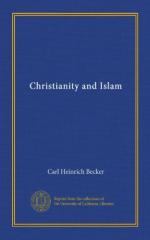of Arab authors, who naturally regarded Islam as the
beginning of all things. In every detail of practical
life they regarded the prophet and his contemporaries
as their ruling ideal, and therefore naturally assumed
that the constitutional practices of the prophet were
his own invention. The organisation of the conquering
race with its tribal subordination was certainly purely
Arab in origin. In fact the conquerors seemed
so unable to adapt themselves to the conditions with
which they met, that foreigners who joined their ranks
were admitted to the Muhammedan confederacy only as
clients of the various Arab tribes. This was,
however, a mere question of outward form: the
internal organisation continued unchanged, as it was
bound to continue unless chaos were to be the consequence.
In fact, pre-existing administrative regulations were
so far retained that the old customs duties on the
former frontiers were levied as before, though they
represented an institution wholly alien to the spirit
of the Muhammedan empire. Those Muhammedan authors,
who describe the administrative organisation, recognise
only the taxes which Islam regarded as lawful and
characterise others as malpractices which had crept
in at a later date. It is remarkable that these
so-called subsequent malpractices correspond with
Byzantine and Persian usage before the conquest:
but tradition will not admit the fact that these remained
unchanged. The same fact is obvious when we consider
the progress of civilisation in general. In every
case the Arabs merely develop the social and economic
achievements of the conquered races to further issues.
Such progress could indeed only be modified by a general
upheaval of existing conditions and no such movement
ever took place. The Germanic tribes destroyed
the civilisations with which they met; they adopted
many of the institutions of Christian antiquity, but
found them an impediment to the development of their
own genius. The Arabs simply continued to develop
the civilisation of post-classical antiquity, with
which they had come in contact.
This procedure may seem entirely natural in the department
of economic life, but by no means inevitable where
intellectual progress is concerned. Yet a similar
course was followed in either case, as may be proved
by dispassionate examination. Islam was a rising
force, a faith rather of experience than of theory
or dogma, when it raised its claims against Christianity,
which represented all pre-existing intellectual culture.
A settlement of these claims was necessary and the
military triumphs are but the prelude to a great accommodation
of intellectual interests. In this Christianity
played the chief part, though Judaism is also represented:
I am inclined, however, to think that Jewish ideas
as they are expressed in the Qoran were often transmitted
through the medium of Christianity. There is no
doubt that in Medina Muhammed was under direct Jewish
influence of extraordinary power. Even at that




